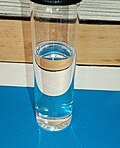Tetrachloroethylene
Tetrachloroethylene (also known as perchloroethylene, PCE, or PERC) is a commonly used solvent in dry cleaning and metal degreasing operations. It is a colorless, nonflammable liquid. The largest user of tetrachloroethylene is the dry cleaning industry. It accounts for 80% to 85% of all dry cleaning fluid used.
History[edit]
Tetrachloroethylene was first synthesized by the French chemist Michael Faraday in 1821. He heated 1,2-dichloroethane in a sealed glass tube and obtained a liquid which he called 'heavy oil of Dutch liquid'. Later in the 19th century, other chemists produced tetrachloroethylene in a similar manner, and it was used for degreasing metals and dry cleaning.
Production[edit]
Tetrachloroethylene is produced by high temperature chlorinolysis of light hydrocarbons. The most common feedstocks include ethylene dichloride (1,2-dichloroethane), trichloroethylene, and carbon tetrachloride.
Uses[edit]
The main use of tetrachloroethylene is in the dry cleaning industry. It is also used in automotive products, such as brake cleaners and gasket removers, and in the semiconductor industry. It is used as a solvent in many industries and as a spotting agent in the textile industry.
Health Effects[edit]
Exposure to tetrachloroethylene may occur through inhalation, skin contact, or ingestion. It can cause irritation of the upper respiratory tract and eyes, kidney dysfunction, and neurological effects such as mood changes, headache, nausea, vomiting, dizziness, and confusion.
Environmental Impact[edit]
Tetrachloroethylene is a persistent organic pollutant. It does not readily degrade in the environment and can contaminate groundwater. It is also a greenhouse gas, with a global warming potential of 1,430.
Regulation[edit]
In the United States, the Environmental Protection Agency (EPA) has set a maximum contaminant level of 5 parts per billion (ppb) for tetrachloroethylene in drinking water. The Occupational Safety and Health Administration (OSHA) has set a permissible exposure limit of 100 parts per million (ppm) over an 8-hour workday.
See Also[edit]
Ad. Transform your life with W8MD's Budget GLP-1 injections from $49.99


W8MD offers a medical weight loss program to lose weight in Philadelphia. Our physician-supervised medical weight loss provides:
- Weight loss injections in NYC (generic and brand names):
- Zepbound / Mounjaro, Wegovy / Ozempic, Saxenda
- Most insurances accepted or discounted self-pay rates. We will obtain insurance prior authorizations if needed.
- Generic GLP1 weight loss injections from $49.99 for the starting dose of Semaglutide and $65.00 for Tirzepatide.
- Also offer prescription weight loss medications including Phentermine, Qsymia, Diethylpropion, Contrave etc.
NYC weight loss doctor appointmentsNYC weight loss doctor appointments
Start your NYC weight loss journey today at our NYC medical weight loss and Philadelphia medical weight loss clinics.
- Call 718-946-5500 to lose weight in NYC or for medical weight loss in Philadelphia 215-676-2334.
- Tags:NYC medical weight loss, Philadelphia lose weight Zepbound NYC, Budget GLP1 weight loss injections, Wegovy Philadelphia, Wegovy NYC, Philadelphia medical weight loss, Brookly weight loss and Wegovy NYC
|
WikiMD's Wellness Encyclopedia |
| Let Food Be Thy Medicine Medicine Thy Food - Hippocrates |
Medical Disclaimer: WikiMD is not a substitute for professional medical advice. The information on WikiMD is provided as an information resource only, may be incorrect, outdated or misleading, and is not to be used or relied on for any diagnostic or treatment purposes. Please consult your health care provider before making any healthcare decisions or for guidance about a specific medical condition. WikiMD expressly disclaims responsibility, and shall have no liability, for any damages, loss, injury, or liability whatsoever suffered as a result of your reliance on the information contained in this site. By visiting this site you agree to the foregoing terms and conditions, which may from time to time be changed or supplemented by WikiMD. If you do not agree to the foregoing terms and conditions, you should not enter or use this site. See full disclaimer.
Credits:Most images are courtesy of Wikimedia commons, and templates, categories Wikipedia, licensed under CC BY SA or similar.
Translate this page: - East Asian
中文,
日本,
한국어,
South Asian
हिन्दी,
தமிழ்,
తెలుగు,
Urdu,
ಕನ್ನಡ,
Southeast Asian
Indonesian,
Vietnamese,
Thai,
မြန်မာဘာသာ,
বাংলা
European
español,
Deutsch,
français,
Greek,
português do Brasil,
polski,
română,
русский,
Nederlands,
norsk,
svenska,
suomi,
Italian
Middle Eastern & African
عربى,
Turkish,
Persian,
Hebrew,
Afrikaans,
isiZulu,
Kiswahili,
Other
Bulgarian,
Hungarian,
Czech,
Swedish,
മലയാളം,
मराठी,
ਪੰਜਾਬੀ,
ગુજરાતી,
Portuguese,
Ukrainian



